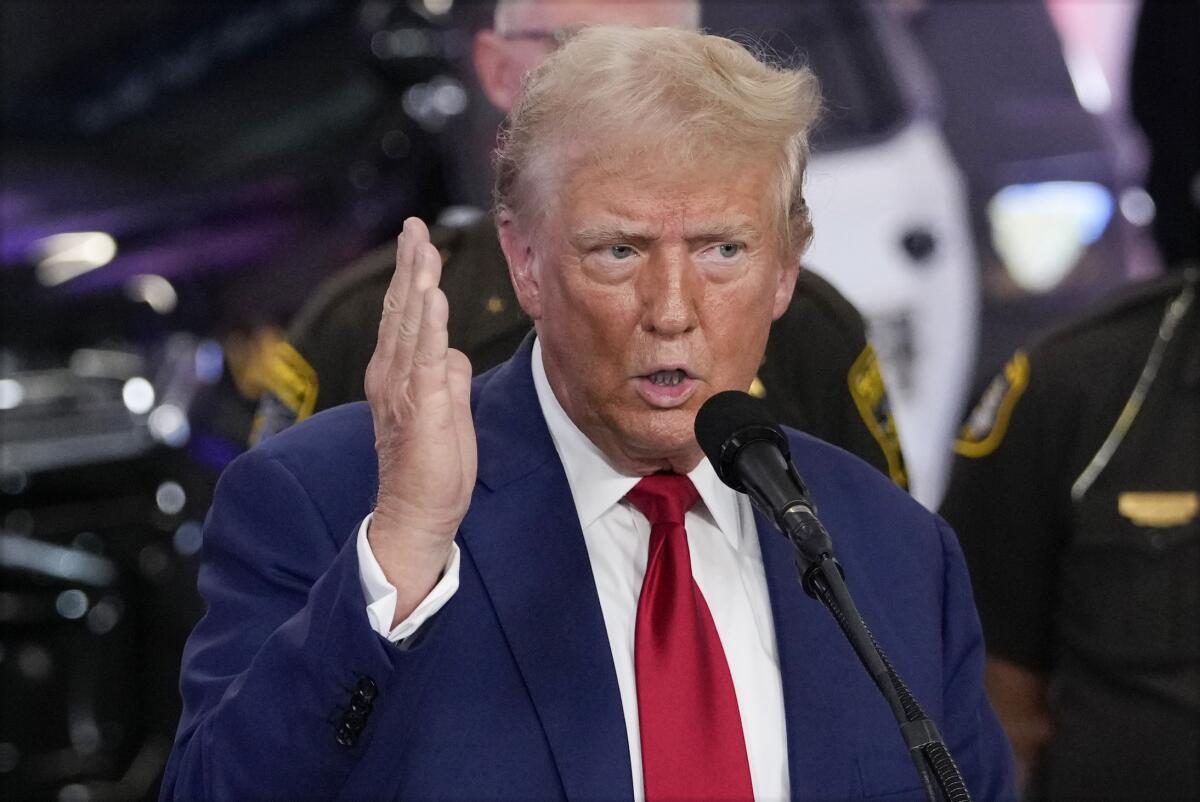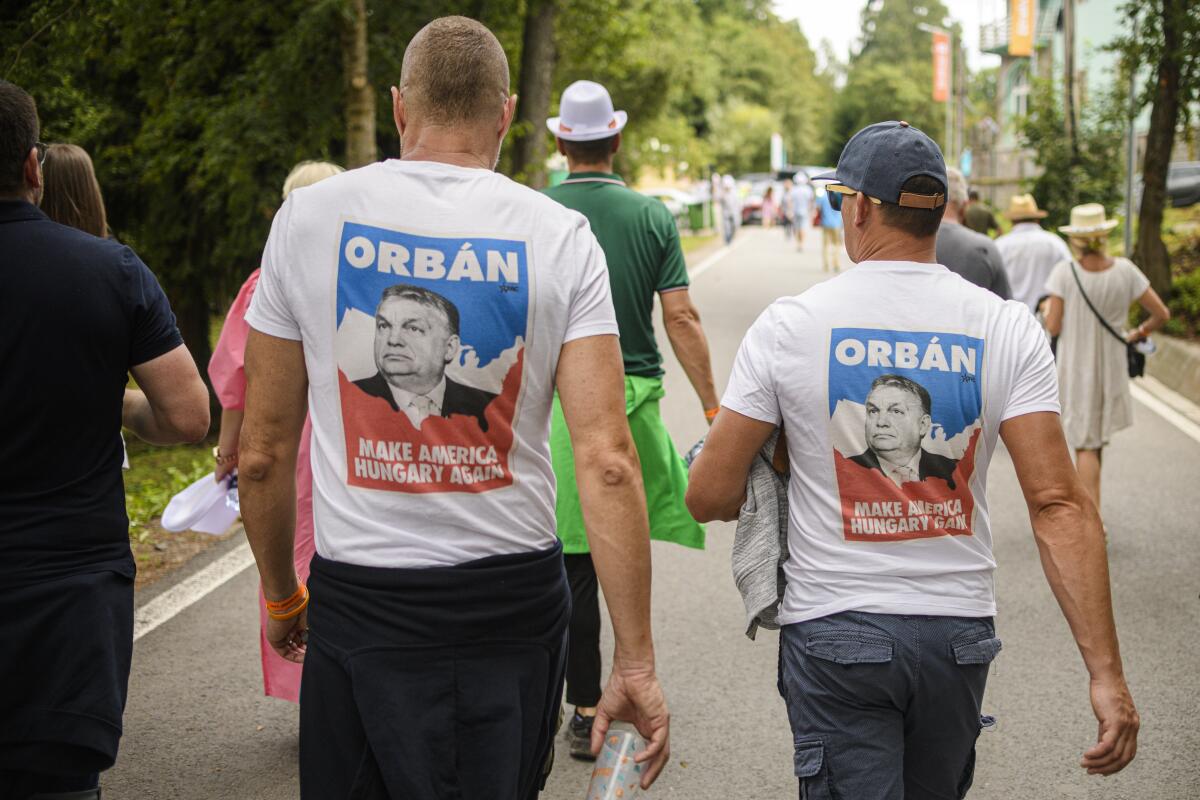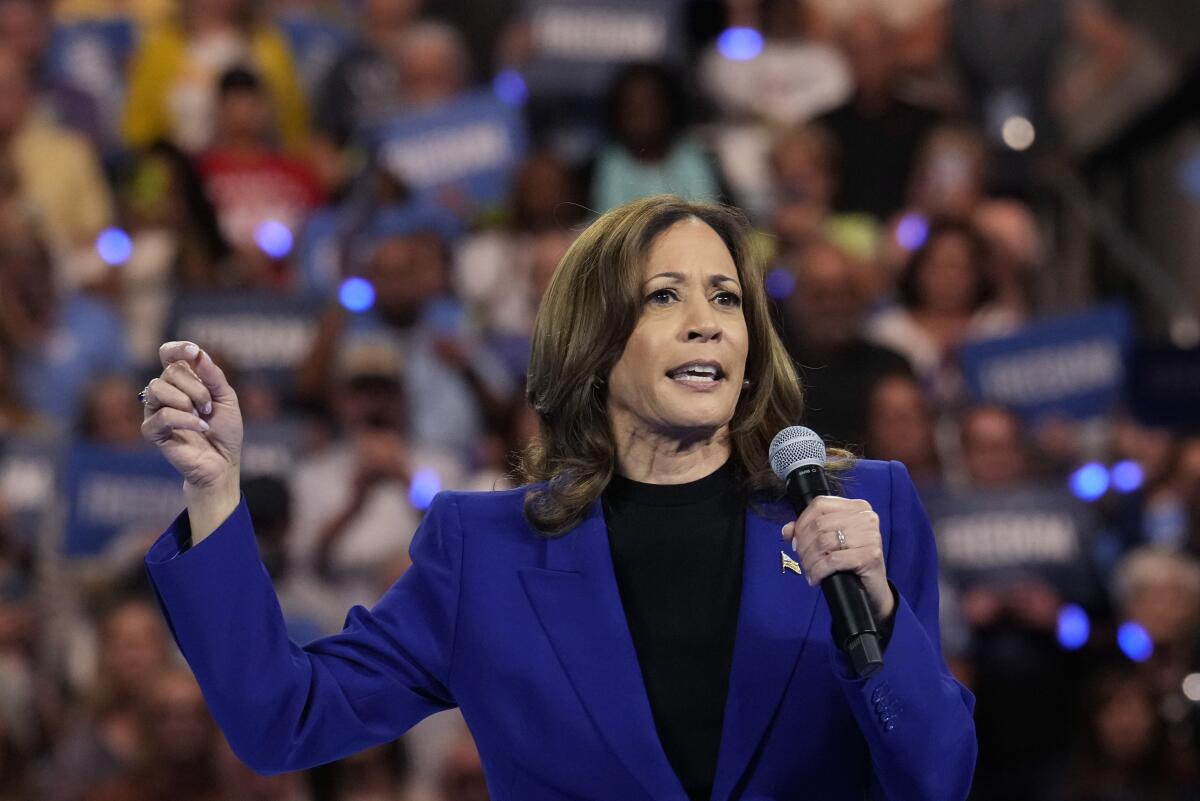Europe turns from Trump-proofing to hope as Kamala Harris is anointed Democratic candidate

- Share via
BERLIN — With Kamala Harris’ formal anointing as the Democratic nominee for president, European allies are relieved by what they see as a diminishing threat of another Donald Trump presidency — but an undercurrent of anxiety remains.
Several weeks ago, when the former president was riding high in the polls after a triumphal Republican convention, the nonstop topic at high-level European gatherings was how to go about “Trump-proofing” institutions that he had often blasted as ineffectual or branded as outright adversaries — including NATO and the European Union.
With Democrats’ rapid consolidation behind Harris after President Biden’s withdrawal from the race, the near-frantic tone of such discussions has largely abated, and the conversation has turned to what to expect from a U.S. administration led by her.
Analysts say European leaders and policymakers generally believe that if Harris prevails in November, there would be crucial continuity in relationships with the continent’s major blocs — the North Atlantic Treaty Organization and the EU — as well as a continuation of cordial bilateral bonds cemented by Biden.
Trump’s running mate, J.D. Vance, once said: ‘I don’t really care what happens to Ukraine one way or the other.’
And the assessment on this side of the Atlantic is that a victorious Harris would keep throwing U.S. weight behind a key European project — aiding Ukraine in its fight against Russia, which launched a full-scale invasion of its neighbor in February 2022.
But beyond those broad parameters, things get a bit more uncertain.
First of all, no one wants to be overconfident about the prospect of a Harris victory. Trump’s tumultuous presidency was something of a trauma for the closest U.S. allies in Europe, starting with his shock election in 2016. During his tenure, he projected indifference to the notion of shared transatlantic interests and values, and took a strikingly deferential tone toward Russian President Vladimir Putin.
Trump’s highly transactional view of international alliances has been on ample display during the current campaign against Harris. “They don’t do anything for us,” he said at a North Carolina rally on Wednesday, referring to U.S. allies.
European anxiety about a repeat Trump performance has eased, but with the race still a tight one, it has not entirely abated.
“He could still win, after all,” said Staffan Lindberg, a political scientist and director of the V-Dem Institute at the University of Gothenburg in Sweden, who has described Trump as a grave threat to democracy. “Everyone is mindful of that.”

The alarm over Trump that peaked earlier this summer might actually have had some beneficial effects, said Liana Fix, a fellow for Europe at the Council on Foreign Relations. Policymakers might now pivot away from crafting plans for Europe to take more responsibility for its own defense, and again “get too cozy” in relying on the U.S.
And the quiet rejoicing over seemingly growing strength of Harris’ election prospects is not universal across Europe, where far-right political movements have largely been held in check in recent elections, but continue to pose a substantial challenge to mainstream political parties.
Far-right leaders in Europe were excited this summer by the prospect of an easy Trump victory, analysts said, while a Harris win would serve to damp a sense of transatlantic momentum for right-wing populist-nationalist figures.
“You are going to have your [Viktor] Orbans hoping for a different result than others,” said Lindberg, referring to the Hungarian prime minister, an avowed Trump acolyte whose decade and a half in power has been marked by sharp erosion of democratic norms in his country — and more recently, by his efforts to undermine European support for Ukraine.
Despite near-solid unanimity among NATO allies over aiding Ukraine, the picture has grown more complicated as the war drags on.

Putin’s full-scale invasion will enter its fourth year soon after a new American administration is inaugurated in January. In some allied states, notably Germany, there has been a pullback from willingness to continue bankrolling the West’s effort to blunt the Russian onslaught.
Ukrainians displaced by war find new purpose in Shakespeare’s play of love, loss and madness, bringing their blood-red version to the bard’s hometown.
Ukraine, meanwhile, has signaled growing impatience with what it considers a pattern of the West providing just enough weaponry to hold off a Russian takeover, but not enough to actually win the war. There has been particular tension surrounding U.S. limitations on Ukrainian use of long-range weapons that can reach inside Russia.
An audacious Ukrainian incursion into Russian territory two weeks ago, about which neither Washington nor European allies were told in advance, underscored that sense of frustration in Kyiv. President Volodymyr Zelensky on Monday criticized restrictions on the use of foreign-provided weaponry, calling the rationale for such curbs “naive” and “illusory.”

European leaders may also be hoping to see more willingness on the part of a prospective Harris administration to act more forcefully to pressure Israeli Prime Minister Benjamin Netanyahu to end the war in Gaza, where the Palestinian death toll has surpassed 40,000, according to health officials in Gaza. More than one-third of the 27 EU members recognize the state of Palestine, which Washington does not.
So far in her short campaign, Harris has publicly hewed to Biden’s support for Israel, but she has also referred to the humanitarian catastrophe in Gaza. In coming weeks, pressure is likely to grow for her to say more on the subject.
“We don’t really know yet what her stance on the Middle East is going to be,” Lindberg said.
This week saw a reprise of what has become a dispiriting diplomatic sequence: the raising, then dashing, of U.S. hopes for a cease-fire deal that would see the release of Hamas-held hostages, with Israeli critics of Netanyahu accusing him of deliberately torpedoing any accord.

Harris, if she becomes president, is at least something of a known quantity to Europeans, having met many leaders and senior policymakers at high-profile events such as the Munich Security Conference, which she attended in February. But a vice president is never the primary interlocutor with Europe — that was always Biden.
Given that, it would take time for Europeans to take her measure — and vice versa, analysts suggested.
“There’s some built-in level of familiarity, but it has its limits,” Lindberg said. “Right now, you can be sure that all of them are trying to find out as much as they can about her, as quickly as they can.”
More to Read
Sign up for Essential California
The most important California stories and recommendations in your inbox every morning.
You may occasionally receive promotional content from the Los Angeles Times.












